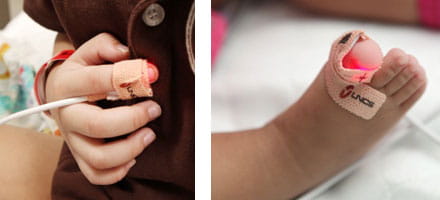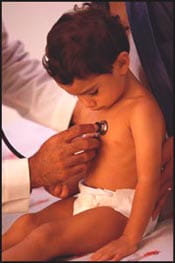Hospitalization for Bronchiolitis
Isolation precautions
Because the virus causing bronchiolitis can be spread to others, your child will be put into an isolation room. An isolation sign will be posted on the door to remind others of precautions, including the following.
- The patient room. The door to the room must remain closed.
- Hand washing. Everyone going in and out of the room must wash his/her hands. Hands must also be washed after providing direct care to the child; whenever hands are soiled by secretions or excretions; and after touching toys, medical equipment and furniture. Hand washing is the best way to prevent the spread of infection.
- Gloves, gowns and masks. Healthcare workers who provide care to multiple patients are required to wear a mask to enter the room, and they put on gloves and gowns during procedures to prevent direct contact of skin and clothing with respiratory secretions and contaminated surfaces.
- Play activities and visitors. Since isolated patients must stay in their bed area, toys and play activities will be provided in your child's room. For the protection of all children and to minimize the spread of the virus, visitors will be limited. Please speak with your child’s nurse about visitors during your child’s admission.
Feeding your baby
Most babies can feed as normal. Your baby will get plenty of liquids while in the hospital. Liquids are one of the most important things needed by a baby with bronchiolitis.
Sometimes while in the hospital, feedings may be decreased or stopped for a short time. This is done if feeding makes your child breathe harder. Feedings may also be decreased or stopped if your baby starts vomiting. If feedings are decreased or stopped for a short time, liquids may be given through a small needle that is put into a vein (IV).
Suctioning the nose
When babies have bronchiolitis, the nose often gets plugged. This can make it hard to breathe while eating. Often the nose of an infant with bronchiolitis will be suctioned before being fed. Sometimes it is hard to suction mucus out of the nose because it is very thick. When this happens, a little bit of saltwater (saline nose drops) is dropped into the nose before suctioning. While in the hospital, you will want to learn how to use a bulb suction so that you will feel comfortable suctioning your baby's nose after you go home.
Oxygen
Every few hours, or more often, your child's nurse or respiratory therapist will check to see how easily your baby is breathing. This assessment will help decide: 1) if extra oxygen is needed, or 2) if the baby is ready to gradually come off the extra oxygen.
A machine called an oximeter is used with these assessments. It is painless and attaches with what looks like a bandage that fits on your child’s finger or toe. The nurse or therapist will teach you what to look for so you can tell if your child is having trouble breathing.

Laboratory and other tests
Bronchiolitis does not usually require testing, but there are some individual exceptions. These tests include some blood tests and a chest X-ray. If any of these are needed, their purpose will be explained to you.
Medicines
Bronchiolitis usually goes away by itself and is not usually helped by giving a lot of medicines, but there are some exceptions. A few medicines may be tried to see if they make your baby feel better. These medicines include:
- A non-aspirin fever medicine may be used if your baby is very uncomfortable or has a fever (Remember, never give aspirin to a baby unless instructed by a doctor.)
- Medicines that your baby can breathe into his/her lungs are sometimes tried and, in some cases, may work in a baby with bronchiolitis
 Several different viruses that cause colds and flu-like illnesses can cause bronchiolitis.
Several different viruses that cause colds and flu-like illnesses can cause bronchiolitis. 




